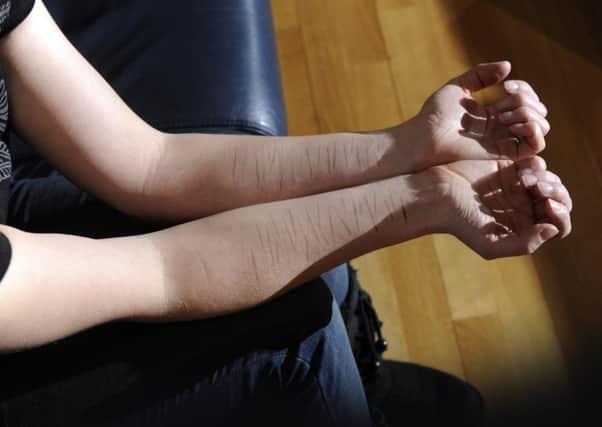Rise in self-harm linked to stress of new school curriculum


The Scottish Secondary Teachers’ Association (SSTA) acknowledged the causes of self-harm were wide and varied, but said the curriculum and its assessments were a contributing factor to stress and could damage welfare.
The number of children admitted to hospital for self-harm doubled in parts of Scotland between 2009 and 2014, according to NHS data obtained by the BBC.
Advertisement
Hide AdAdvertisement
Hide AdChildLine reported a 20 per cent increase in counselling sessions in 2014, and mental health charity Penumbra reported a 166 per cent rise in referrals since 2009.
Seamus Searson, SSTA general secretary, said the union “is acutely aware of the workload pressures associated with the National Qualifications but is extremely concerned as to the potential damage on our young people as the pressure intensifies at this time of year”.
He added: “There is evidence that a rising numbers of pupils are being identified as self-harming. The causes of self-harm are wide and varied.
“But equally, we have to accept that school, the curriculum, the at times unrelenting internal assessment of our 15- and 16-year-olds between January and April is a contributing factor to pupil stress and can damage pupil welfare.
“How do we, as a teacher profession, respond to it?
“Teachers can question the pointless and often invalid assessment burdens. Teachers question the frequency and intensity of assessment faced by our 15 and 16-year-olds sitting N4 and N5.”
He said an average pupil in S4 faces 24 assessments in at least six subjects between January and April.
One unnamed English teacher quoted by the SSTA said some of these assessments were “pointless” not necessary for the exam, not valuable for progression and did not develop skills for work.
ChildLine Scotland reported, in February 2015, that counselling sessions with 12- to 15-year-olds on self-harm had increased by 20 per cent in the last year.
Advertisement
Hide AdAdvertisement
Hide AdA 2014 report by the Edinburgh based mental health charity, Penumbra, revealed that, since 2009, there has been an increase of 166 per cent in the number of referrals it has received. Nigel Henderson, chief executive of Penumbra, said these figures were “just the tip of the iceberg”.
At the time he said: “Problems at school, parental pressure to succeed or feelings of low self-esteem, alongside changes in local authorities’ services, welfare reform and local youth unemployment may all have had an impact on the figures”.
Euan Duncan, SSTA president, said: “Teachers have been, by and large, left to develop courses and assessments as they teach them. This is overbearing stress that experienced professionals, as adults, are struggling with and that stress is unintentionally, yet undeniably, being transmitted on to our pupils.”